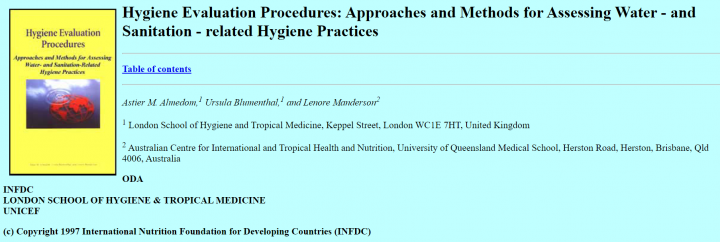Hygiene Evaluation Procedures, Approaches and Methods for Assessing Water- and Sanitation-Related Hygiene Practices Almedom, A., Blumenthal, U., Manderson, L. (1997)
The handbook provides practical guidelines for evaluation water- and sanitation-related hygiene practices. An evaluation of hygiene practices can be used for the purposes of project planning, monitoring, or final assessment of the project’s impact. The main focus is on the practical concerns of field personnel working in water supply, sanitation, and health/hygiene education projects who want to design and conduct their own evaluations of hygiene practices. It is designed to make qualitative research skills accessible to practitioners with little or no previous training in social sciences and emphasizes how to gather, review, and interpret qualitative information. The handbook was developed as a practical answer to the limitations of using a single method or instrument for information gathering, especially when trying to investigate sociocultural aspects of human behavior that do not easily lend themselves to quantifiable measurement. It explores alternatives to the limitations of a questionnaire-based survey design by examining other tools for systematically gathering qualitative information. It includes use of a variety of methods and tools which can be chosen and combined; appraisals of individuals methods and tools to help in the selection of the most appropriate combinations of methods for the desired purpose; and examples from field experience of common mistakes and pitfalls. The use of a variety (triangulation) of sources and methods is advocated as the best way to obtain complete and reliable information on the issues under study.
Bibliographic information
Almedom, A., Blumenthal, U., Manderson, L. (1997). Hygiene Evaluation Procedures, Approaches and Methods for Assessing Water- and Sanitation-Related Hygiene Practices INFDC, LONDON SCHOOL OF HYGIENE & TROPICAL MEDICINE, UNICEF
Filter / Tags
Guidelines and manualsEnglish

